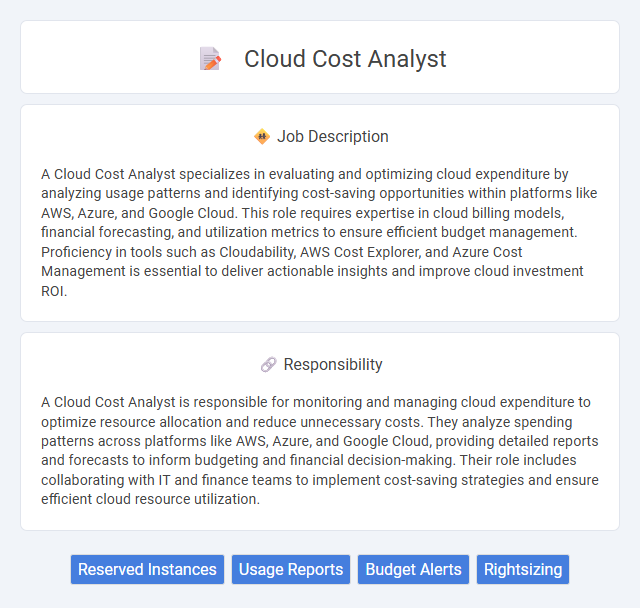
A Cloud Cost Analyst specializes in evaluating and optimizing cloud expenditure by analyzing usage patterns and identifying cost-saving opportunities within platforms like AWS, Azure, and Google Cloud. This role requires expertise in cloud billing models, financial forecasting, and utilization metrics to ensure efficient budget management. Proficiency in tools such as Cloudability, AWS Cost Explorer, and Azure Cost Management is essential to deliver actionable insights and improve cloud investment ROI.
Individuals with strong analytical skills and a keen eye for detail are likely suitable for a Cloud Cost Analyst role, as the job requires thorough examination of cloud expenditure patterns. People who are comfortable working with data, budget management, and cross-team collaboration may find this position aligns well with their strengths. Those who prefer dynamic environments and continuous learning about cloud technologies could probably excel in managing cost efficiency within organizations.
Qualification
A Cloud Cost Analyst typically requires a strong background in cloud computing platforms such as AWS, Azure, or Google Cloud, along with expertise in cost management tools like AWS Cost Explorer or Cloudability. Proficiency in data analysis, financial modeling, and budgeting is essential to optimize cloud expenditures and forecast future costs accurately. Certifications such as AWS Certified Cloud Practitioner or Azure Cost Management Specialist enhance qualifications and demonstrate specialized knowledge in cloud cost optimization.
Responsibility
A Cloud Cost Analyst is responsible for monitoring and managing cloud expenditure to optimize resource allocation and reduce unnecessary costs. They analyze spending patterns across platforms like AWS, Azure, and Google Cloud, providing detailed reports and forecasts to inform budgeting and financial decision-making. Their role includes collaborating with IT and finance teams to implement cost-saving strategies and ensure efficient cloud resource utilization.
Benefit
A Cloud Cost Analyst likely helps organizations optimize their cloud spending by analyzing usage patterns and identifying cost-saving opportunities. This role may contribute to improved budget management, increased financial transparency, and enhanced decision-making regarding cloud resources. Companies could experience reduced expenses and more efficient allocation of cloud investments through the analyst's insights.
Challenge
The role of a Cloud Cost Analyst likely involves the challenge of accurately forecasting and managing fluctuating cloud expenses in dynamic environments. They probably face difficulties in optimizing resource allocation while balancing performance and budget constraints. Navigating complex pricing models and ensuring cost transparency across departments may also pose significant challenges.
Career Advancement
A Cloud Cost Analyst plays a vital role in managing and optimizing cloud expenditures, leveraging tools like AWS Cost Explorer and Azure Cost Management to reduce unnecessary spending. Mastery of cloud financial management and data analytics can propel professionals towards advanced roles such as Cloud Financial Architect or FinOps Manager. Continuous certification in cloud platforms and financial operations enhances career growth and opens opportunities for leadership positions in cloud cost governance.
Key Terms
Reserved Instances
A Cloud Cost Analyst specializing in Reserved Instances optimizes cloud spending by analyzing usage patterns and recommending reservation strategies that maximize cost savings for organizations using AWS, Azure, or Google Cloud. They evaluate Reserved Instance purchasing options, including term lengths and instance types, to ensure alignment with workload demands while minimizing financial waste. This role requires strong skills in cost forecasting, capacity planning, and detailed reporting to track reserved capacity utilization and ROI.
Usage Reports
A Cloud Cost Analyst specializes in analyzing cloud usage reports to optimize spending and ensure efficient resource allocation. They utilize tools such as AWS Cost Explorer, Azure Cost Management, and Google Cloud's Billing Reports to identify cost-saving opportunities and track consumption patterns across various cloud services. Expertise in interpreting detailed usage data enables accurate forecasting, budgeting, and strategic decision-making to maximize cloud investment ROI.
Budget Alerts
A Cloud Cost Analyst specializes in monitoring and managing cloud expenditures by configuring Budget Alerts to prevent overspending and ensure adherence to financial plans. Budget Alerts enable real-time notifications when cloud usage approaches or exceeds predefined spending thresholds across platforms like AWS, Azure, or Google Cloud. These alerts facilitate proactive cost optimization, resource allocation, and help maintain organizational cloud budget compliance.
Rightsizing
A Cloud Cost Analyst specializing in rightsizing evaluates cloud resource usage to optimize expenditure by identifying underutilized or over-provisioned assets. They use detailed data analysis and forecasting tools to recommend scaling adjustments that align cloud services with actual business demand. Implementing rightsizing strategies can reduce unnecessary cloud spend by up to 30%, improving overall financial efficiency in cloud operations.
 kuljobs.com
kuljobs.com